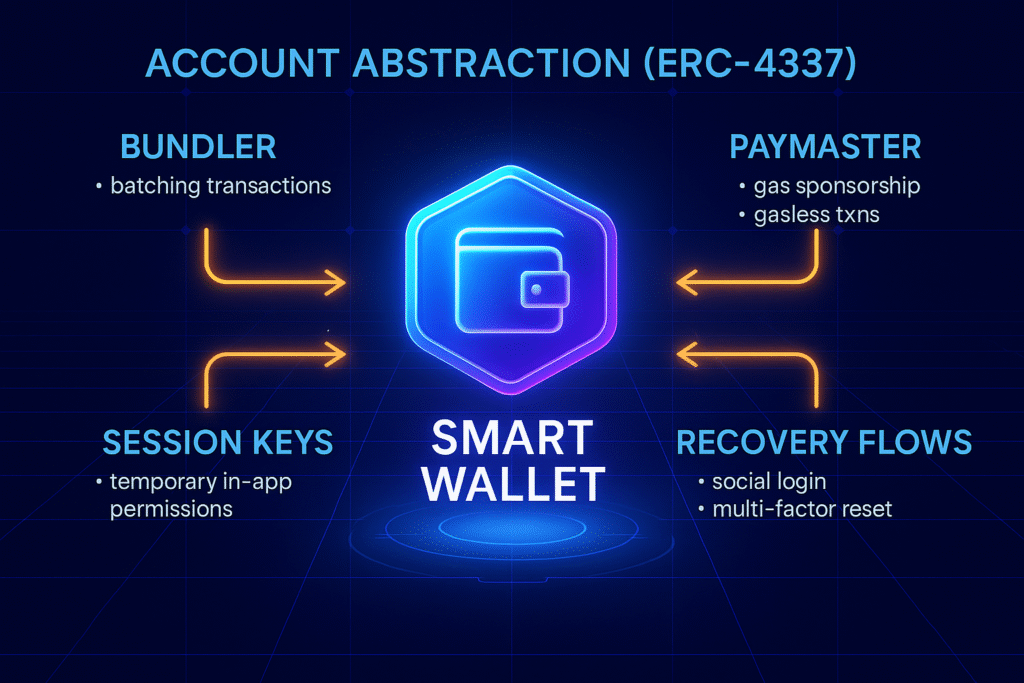Why Web3 Still Struggles With UX
Launching a token or NFT is easy. Onboarding millions of users isn’t.
Seed phrases, gas fees, chain confusion, failed transactions—these are the invisible walls that keep everyday users from joining Web3. We’ve promised mass adoption for years, but the UX gap remains.
Account Abstraction (AA), standardized as ERC-4337, is the breakthrough designed to remove that wall.
What Is Account Abstraction (ERC-4337)?
At its core, account abstraction transforms traditional wallets into smart accounts.
Instead of rigid “EOAs” (Externally Owned Accounts) that require private keys for every action, AA allows wallets to function like programmable smart contracts:
- Bundlers batch transactions, removing friction.
- Paymasters sponsor or subsidize gas fees, enabling gasless transactions.
- Session keys authorize certain actions without constant prompts.
Result: logging into a dApp starts to feel more like logging into Gmail than handling a cryptographic ceremony.
Why It Matters in 2025
- Gasless UX: Paymasters can cover transaction fees—users interact without even knowing what “gas” is.
- Social Logins: Users can create wallets with Google/Apple sign-in, then upgrade later to full self-custody.
- Recovery Without Fear: No more “lose your seed, lose your funds.” Multi-factor recovery flows are built in.
- Business Models: Loyalty, gaming, retail, and e-commerce can onboard non-crypto natives at scale.
Smart Wallets vs Custodial vs MPC
- Custodial: Simple, but users don’t truly own assets.
- MPC (Multi-Party Computation): Secure, shares key material, but still feels abstract to end-users.
- AA Smart Wallets: Balance of UX + ownership. Recovery, sponsorship, and permissions are programmable.
Gasless & Sponsored Transactions
Think of a loyalty app: the first 10 NFT claims are gasless, sponsored by the brand.
With paymasters, this is easy to implement. Developers can whitelist actions, set rate limits, and only pay for meaningful interactions.
This isn’t just user-friendly—it’s growth hacking baked into the protocol.
Session Keys & In-App Actions
Games and consumer apps benefit most. Instead of approving every move, users can grant session keys:
- Allowing “X number of transactions” per session.
- Limiting what actions are authorized (e.g., swaps but not withdrawals).
It’s Web3, but designed for flow.
7-Day Smart-Wallet Implementation Blueprint
Day 1–2: Choose your AA wallet SDK (Safe, ZeroDev, Biconomy, etc.) + target chain.
Day 3–4: Build social login + wallet initialization; integrate a paymaster.
Day 5: Add a “first action” (claim, mint, or loyalty reward).
Day 6: Implement session keys + rate limits.
Day 7: Add analytics funnels + FAQ/recovery guide.
At the end, you’ll have a working AA onboarding flow that feels Web2-simple, but is fully Web3-powered.
Case Snapshots
- Retail Loyalty: Users claim gasless on-chain reward points with one click.
- Gaming: Players sign once, then session keys handle all in-game actions.
- E-Commerce: Token-gated product drops + on-chain refunds without “learn MetaMask first.”
Challenges & Compliance
- Fraud & Abuse: Sponsored gas needs monitoring + rate limits.
- Cross-Chain UX: Different chains, same wallet—still evolving.
- Regulatory: Recovery flows + KYC hooks must meet local standards.
But the upside outweighs the hurdles: frictionless onboarding means real adoption.
FAQ
Is account abstraction secure?
Yes. Smart wallets inherit security from Ethereum’s standards, plus programmable recovery flows.
Do users still need seed phrases?
Not necessarily—social logins + multi-factor recovery can replace them.
Is it expensive?
Costs vary, but sponsored gas can be tightly controlled.
Can I use it with RWAs?
Yes—AA simplifies custody and compliance flows for tokenized assets.
Key Takeaway
Account Abstraction is not just a developer feature. It’s the missing bridge from Web3 experiments to Web3 at scale.
For startups, enterprises, and builders, 2025 is the year to experiment with smart wallets, sponsored gas, and session keys. If the next billion users are going to join, this is how it happens.

